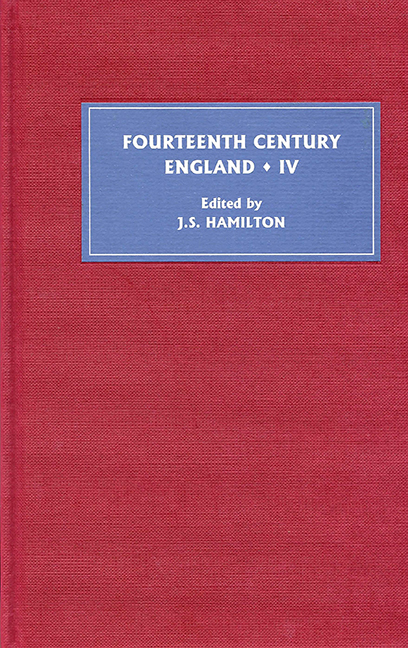Book contents
- Frontmatter
- Contents
- List of Illustrations
- Contributors
- Preface
- Abbreviations
- Who was St Thomas of Lancaster? New Manuscript Evidence
- ‘Hedging, Ditching and Other Improper Occupations’: Royal Landscapes and their Meaning under Edward II and Edward III
- Paying for the Wedding: Edward III as Fundraiser, 1332–3
- The Politics of Privilege: Thomas Hatfield and the Palatinate of Durham, 1345–81
- Agnes Maltravers (d. 1375) and her Husband John (d. 1364): Rebel Wives, Separate Lives, and Conjugal Visits in Later Medieval England
- Gendering Pastoral Care: John Mirk and his Instructions for Parish Priests
- Prosecution of the Statutes of Provisors and Premunire in the King's Bench, 1377–1394
- ‘Mercy and Truth Preserve the King’: Richard II's Use of the Royal Pardon in 1397 and 1398
- Aliens in the Pardons of Richard II
- ‘Too Flattering Sweet to be Substantial’? The Last Months of Thomas, Lord Despenser
- ‘O Prince, Desyre to be Honourable’: The Deposition of Richard II and Mirrors for Princes
- Regional Politics, Landed Society and the Coal Industry in North-East England, 1350–1430
‘Mercy and Truth Preserve the King’: Richard II's Use of the Royal Pardon in 1397 and 1398
Published online by Cambridge University Press: 12 September 2017
- Frontmatter
- Contents
- List of Illustrations
- Contributors
- Preface
- Abbreviations
- Who was St Thomas of Lancaster? New Manuscript Evidence
- ‘Hedging, Ditching and Other Improper Occupations’: Royal Landscapes and their Meaning under Edward II and Edward III
- Paying for the Wedding: Edward III as Fundraiser, 1332–3
- The Politics of Privilege: Thomas Hatfield and the Palatinate of Durham, 1345–81
- Agnes Maltravers (d. 1375) and her Husband John (d. 1364): Rebel Wives, Separate Lives, and Conjugal Visits in Later Medieval England
- Gendering Pastoral Care: John Mirk and his Instructions for Parish Priests
- Prosecution of the Statutes of Provisors and Premunire in the King's Bench, 1377–1394
- ‘Mercy and Truth Preserve the King’: Richard II's Use of the Royal Pardon in 1397 and 1398
- Aliens in the Pardons of Richard II
- ‘Too Flattering Sweet to be Substantial’? The Last Months of Thomas, Lord Despenser
- ‘O Prince, Desyre to be Honourable’: The Deposition of Richard II and Mirrors for Princes
- Regional Politics, Landed Society and the Coal Industry in North-East England, 1350–1430
Summary
Richard II convened his so-called ‘Revenge Parliament’ on 17 September 1397, with the intention of imposing a new personal agenda on the polity of the realm. Two months earlier the king had ordered the arrest of his longstanding political opponents, the Lords Appellant, and the autumn parliament provided the forum for their public trial and conviction. Furthermore, he extorted concessions from the Lords and Commons which effectively curtailed the powers of parliament. For the chronicler Thomas Walsingham these events were the herald of a new and tyrannical phase of Richard's reign, and historians have generated a considerable body of scholarship in their attempt to elucidate the distinctive character of this period. However, these studies have struggled to explain the motivation behind the dramatic events of 1397–8. The intention of this article is to suggest that one vital element of Richard II's ‘tyranny’ has been overlooked, namely his view of the role and significance of the royal pardon. Beyond the drama of parliamentary proceedings, scant attention has been paid to the way in which Richard actually used the royal pardon in these years to bring pressure to bear on his political opponents. While the chroniclers dwell on the set-piece show trials of Arundel and Warwick, they allude only briefly to events occurring outside the limelight of parliament. Walsingham refers to a vague atmosphere of suspicion, and to secretive activities carried out by royal agents in order to secure forced loans for the king. The administrative records of government, however, contain a whole series of veiled references to arrests, imprisonments and council meetings, which, when pieced together, reveal a sequence of events revolving around the use of the royal pardon as a political bargaining tool. Richard, it seems, was using the very concept of pardon to justify his move against the supporters of the Lords Appellant in the autumn of 1397.
- Type
- Chapter
- Information
- Fourteenth Century England IV , pp. 124 - 135Publisher: Boydell & BrewerPrint publication year: 2006



